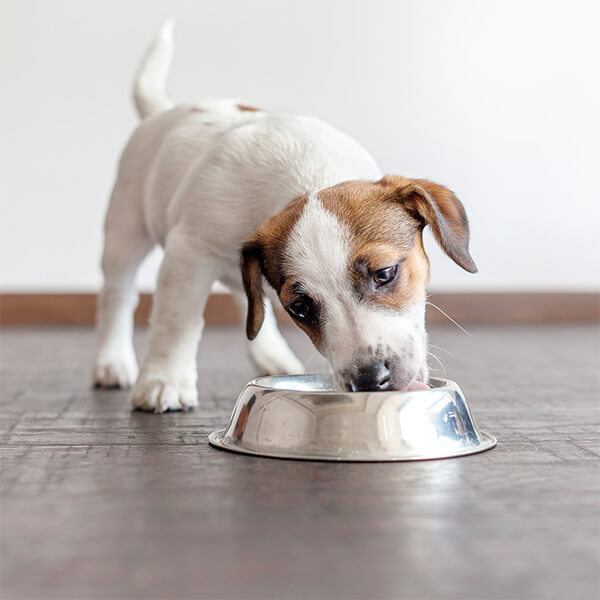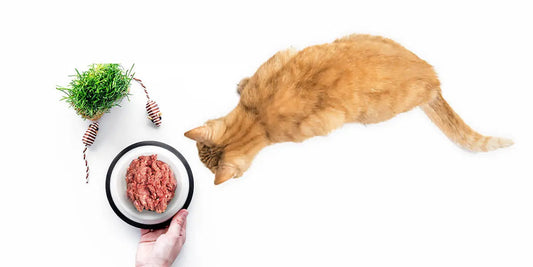
What to Feed a New Puppy
Reviewed by Dr. Tori Jones
The most important time to feed great food is when your newborn puppy is young. Great nutrition helps build a solid foundation upon which your puppy can live long and prosper. When the mother is unavailable, using a commercial milk replacer is essential for meeting the nutritional needs of newborn puppies.
Puppies, as a general rule, require high protein, balanced fat, mineral-rich diets (giant breed dog owners should discuss food with their vets and breeders). Not all raw diets are high protein: some popular, lower-cost raw diets are mostly fat and probably should not be fed to puppies.
The actual fat content of dog food is not always shown on the label because fat is listed as a minimum. A label can read “6% fat (minimum)” and actually be 18% fat! The best way to tell how much fat is in a raw diet is to go to the company’s website and find out the amount of calories per ounce in the product. Lean, high protein foods appropriate for puppies should have 25 to 40 kcal/ ounce, while fatty foods, which should probably not be fed to puppies (or any dog, in my opinion), have 50 to 65 kcal per ounce. (Fat has more than twice the calories per ounce than protein).
It’s also important to feed puppies a variety of healthy foods, rotating the different meat and fat sources so they get accustomed to eating almost anything. Many puppies brought up on just one food have difficulty adjusting to a variety of foods later in life. Variety is natural and healthy. Just as you would not want your child to eat just one food all the time, you should not feed your puppy one food all the time. Puppies require more nutrients for their rapid growth compared to adult dogs, which maintain their bodies with differing dietary requirements.
Welcoming a new puppy into your family is an exciting experience, but it also comes with significant responsibilities. One of the most critical aspects of puppy care is nutrition. Most puppies require specific feeding, socialization, and transitioning to solid food during their early stages to ensure proper growth and development.
Feeding Newborn Puppies Tips
Feeding newborn puppies requires careful attention to their nutritional needs. Here are some tips for feeding newborn puppies:
- Frequent Feedings: Newborn puppies should be fed every 2-4 hours, or as needed, to ensure they receive adequate nutrition.
- Use a Commercial Puppy Milk Replacer: If the mother’s milk is unavailable, a commercial puppy milk replacer is essential. These replacers are specially formulated to meet the nutritional needs of newborn puppies.
- Warm the Milk Replacer: Before feeding, warm the milk replacer to approximately 100°F (38°C) to mimic the temperature of the mother’s milk.
- Proper Feeding Position: Feed newborn puppies in a horizontal, head-neutral position to prevent aspiration.
- Monitor Weight: Regularly monitor the puppy’s weight as needed to ensure they are growing properly.
By following these tips, you can help ensure that your newborn puppies receive the nutrition they need for healthy development.
Choosing the Right Puppy Food
When it comes to feeding your puppy, there are several options to consider, including dry food, wet food, and semi-moist food. Each type has its own set of advantages and disadvantages, and the best choice depends on your puppy’s age, breed, and individual needs. For instance, large-breed puppies require a controlled growth diet to prevent skeletal issues, while small-breed puppies benefit from a nutrient-dense diet to support their rapid growth.
Developmental Stages of Puppies
Puppies go through several developmental stages, each with unique nutritional needs. During the neonatal period (0-4 weeks), puppies are in a critical phase of growth and development, requiring frequent feeding and close monitoring. It is crucial to maintain the milk replacer at the puppy's body temperature of about 100 degrees Fahrenheit to prevent hypothermia, which can lead to decreased feeding and severe health issues. As they transition from 4 to 12 weeks of age, they begin to wean off their mother’s milk and need a balanced diet that supports their rapid growth. The growth period, which spans from 12 to 18 months, is marked by continued development, necessitating a nutrient-rich diet to support their evolving needs. Ensuring a balanced diet during these stages is key to fostering a healthy and happy puppy.
Weaning Newborn Puppies
Weaning newborn puppies requires a gradual transition from milk replacer to solid food. Here are some tips for weaning newborn puppies:
- Start Weaning at 3-4 Weeks of Age: Begin the weaning process when puppies are around 3-4 weeks old.
- Create a Gruel: Mix a small amount of solid food with the milk replacer to create a gruel. This helps puppies get used to the texture and taste of solid food.
- Gradually Increase Solid Food: Over time, gradually increase the amount of solid food and decrease the amount of milk replacer.
- Complete Weaning by 6-8 Weeks of Age: Aim to complete the weaning process by the time puppies are 6-8 weeks old.
By following these tips, you can help ensure a smooth transition from milk replacer to solid food, setting the stage for healthy growth and development.
Supporting Your Puppy’s Growth
As your puppy grows, their nutritional needs evolve. When they reach adulthood, Darwin’s Natural Pet Products can provide a species-appropriate raw diet to support their ongoing health and well-being. With over 20 years of expertise and more than 100 million fresh, raw meals served, Darwin’s delivers high-quality raw dog food made from free-range meats and organic vegetables.
Explore pet food delivery options and learn about the benefits of raw dog food for your pet's long-term health. With Darwin’s, you can provide the best nutrition for your furry family member.
Last Updated on


